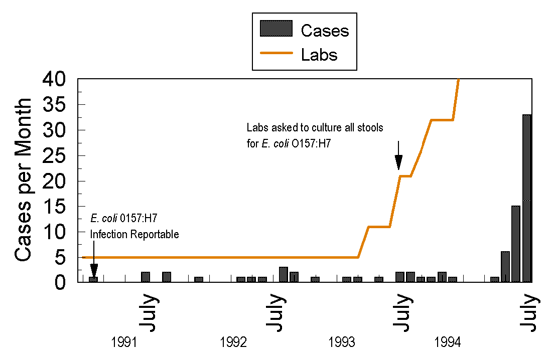Volume 7, Number 3—June 2001
Synopsis
PulseNet: The Molecular Subtyping Network for Foodborne Bacterial Disease Surveillance, United States
Figure 3

Figure 3. . Reported cases of culture-confirmed Escherichia coli O157:H7 infection and percentage of surveyed laboratories routinely testing all stool specimens for E. coli O157:H7, New Jersey, January 1991 through July 1994 (10).
References
- Holmberg SD, Wachsmuth IK, Hickman-Brenner FW, Cohen ML. Comparison of plasmid profile analysis, phage typing, and antimicrobial susceptibility testing in characterizing Salmonella typhimurium isolates from outbreaks. J Clin Microbiol. 1984;19:100–4.PubMedGoogle Scholar
- Holmberg SD, Wachsmuth K. Plasmid and chromosomal DNA analyses in the epidemiology of bacterial diseases. In: Swaminathan B, Prakash G, editors. Nucleic acid and monoclonal antibody probes: applications in diagnostic microbiology. New York: Marcel Dekker; 1989. p. 105-29.
- Ackers ML, Mahon BE, Leahy E, Goode B, Damrow T, Hayes PS, An outbreak of Escherichia coli O157:H7 infections associated with leaf lettuce consumption. J Infect Dis. 1998;177:1588–93. DOIPubMedGoogle Scholar
- Barrett TJ. Molecular fingerprinting of foodborne pathogenic bacteria: An introduction to methods, uses and problems. In: Tortorello ML, Gendel SM, editors. Food microbiological analysis: new technologies. New York: Marcel Dekker; 1997. p. 249-64.
- Graves LM, Swaminathan B, Hunter SB. Subtyping Listeria monocytogenes. In: Ryser EM, Marth EH, editors. Listeria, listeriosis and food safety. New York: Marcel Dekker; 1999. p. 279-98.
- Jimenez A, Barros-Velazquez J, Rodriguez J, Villa TG. Restriction endonuclease analysis, DNA relatedness and phenotypic characterization of Campylobacter jejuni and Campylobacter coli isolates invovled in food-borne disease. J Appl Microbiol. 1997;82:713–21. DOIPubMedGoogle Scholar
- Maslanka SE, Kerr JG, Williams G, Barbaree JM, Carson LA, Miller JM, Molecular subtyping of Clostridium perfringens by pulsed-field gel electrophoresis to facilitate food-borne-disease outbreak investigations. J Clin Microbiol. 1999;37:2209–14.PubMedGoogle Scholar
- Threlfall EJ, Hampton MD, Ward LR, Rowe B. Application of pulsed-field gel electrophoresis to an international outbreak of Salmonella agona. Emerg Infect Dis. 1996;2:130–2. DOIPubMedGoogle Scholar
- Threlfall EJ, Ward LR, Hampton MD, Ridley AM, Rowe B, Roberts D, Molecular fingerprinting defines a strain of Salmonella enterica serotype Anatum responsible for an international outbreak associated with formula-dried milk. Epidemiol Infect. 1998;121:289–93. DOIPubMedGoogle Scholar
- Wachsmuth K. Molecular epidemiology of bacteria infections: examples of methodology and of investigations of outbreaks. Rev Infect Dis. 1986;8:682–92. DOIPubMedGoogle Scholar
- Swaminathan B, Matar GM. Molecular typing methods. In: Persing DH, Smith TF, Tenover FC, White TJ, editors. Diagnostic molecular microbiology. Washington: American Society for Microbiology; 1993. p. 26-50.
- Barrett TJ, Lior H, Green JH, Khakhria R, Wells JG, Bell BP, Laboratory investigation of a multi-state food-borne outbreak of Escherichia coli O157:H7 by using pulsed-field gel electrophoresis and phage typing. J Clin Microbiol. 1994;32:3013–7.PubMedGoogle Scholar
- Stephenson J. New approaches for detecting and curtailing foodborne microbial infections. JAMA. 1997;277:1337–40. DOIPubMedGoogle Scholar
- Centers for Disease Control and Prevention. Addressing emerging infectious disease threats: a prevention strategy for the United States. Atlanta: U.S. Department of Health and Human Services; 1994.
- Angulo FJ, Voetsch AC, Vugia D, Hadler JL, Farley M, Hedberg C, Determining the burden of human illness from food borne diseases. CDC's emerging infectious disease program Food Borne Diseases Active Surveillance Network (FoodNet). Vet Clin North Am Food Anim Pract. 1998;14:165–72.PubMedGoogle Scholar
- Gautom RK. Rapid pulsed-field gel electrophoresis protocol for E. coli O157:H7 and other Gram-negative organisms in one day. J Clin Microbiol. 1997;35:2977–80.PubMedGoogle Scholar
- Centers for Disease Control and Prevention. Standardized molecular subtyping of foodborne bacterial pathogens by pulsed-field gel electrophoresis: a manual. Atlanta: National Center for Infectious Diseases; 1996 (updated 2000).
- Cody SH, Glynn MK, Farrar JA, Cairns KL, Griffin PM, Kobayashi J, An outbreak of Escherichia coli O157:H7 infection from unpasteurized commercial apple juice. Ann Intern Med. 1999;130:202–9.PubMedGoogle Scholar
- Centers for Disease Control and Prevention. Multistate outbreak of Salmonella serotype Agona infections linked to toasted oats cereal--United States, April-May, 1998. MMWR Morb Mortal Wkly Rep. 1998;47:462–4.PubMedGoogle Scholar
- Centers for Disease Control and Prevention. Multistate outbreak of listeriosis--United States, 1998. MMWR Morb Mortal Wkly Rep. 1998;47:1085–6.PubMedGoogle Scholar
- Centers for Disease Control and Prevention. Update: multistate outbreak of listeriosis--United States, 1998-1999. MMWR Morb Mortal Wkly Rep. 1999;47:1117–8.PubMedGoogle Scholar
- Centers for Disease Control and Prevention. Outbreaks of Shigella sonnei infection associated with eating fresh parsley--United States and Canada, July-August, 1998. MMWR Morb Mortal Wkly Rep. 1999;48:285–9.PubMedGoogle Scholar
- Mead P, Finelli L, Lambert-Fair MA, Champ D, Townes J, Hutwagner L, Risk factors for sporadic infection with Escherichia coli O157:H7. Arch Intern Med. 1997;157:204–8. DOIPubMedGoogle Scholar
- Keene W, Hedberg K, Herriott DE, Hancock DD, McKay RW, Barrett TJ, A prolonged outbreak of Escherichia coli O157:H7 infections caused by commercially distributed milk. J Infect Dis. 1997;176:815–8. DOIPubMedGoogle Scholar
- Jackson LA, Keene WE, McAnulty JM, Alexander ER, Diermayer M, Davis MA, Where's the beef? The role of cross-contamination in four chain restaurant-associated outbreaks of Escherichia coli O157:H7 in the Pacific Northwest. Ann Intern Med. 2000;160:2380–5. DOIGoogle Scholar
- Elbasha EH, Fitzsimmons TD, Meltzer MI. Costs and benefits of a subtype-specific surveillance system for identifying Escherichia coli O157:H7 outbreaks. Emerg Infect Dis. 2000;6:293–7. DOIPubMedGoogle Scholar
1The CDC PulseNet Task Force includes John Allan, Michelle Bird, Daniel Cameron, Wallis DeWitt, Thomas Donkar, Collette Fitzgerald, Judy Gaither, Lewis Graves, Peggy Hayes, Jared Kerr, Kristy Kubota, Mary Ann Lambert-Fair, Susan Maslanka, Loretta McCroskey, Jeremy Miller, Heather Noll, Efrain Ribot, Nicole Tucker, Susan Van Duyne, and the authors.
Page created: April 26, 2012
Page updated: April 26, 2012
Page reviewed: April 26, 2012
The conclusions, findings, and opinions expressed by authors contributing to this journal do not necessarily reflect the official position of the U.S. Department of Health and Human Services, the Public Health Service, the Centers for Disease Control and Prevention, or the authors' affiliated institutions. Use of trade names is for identification only and does not imply endorsement by any of the groups named above.